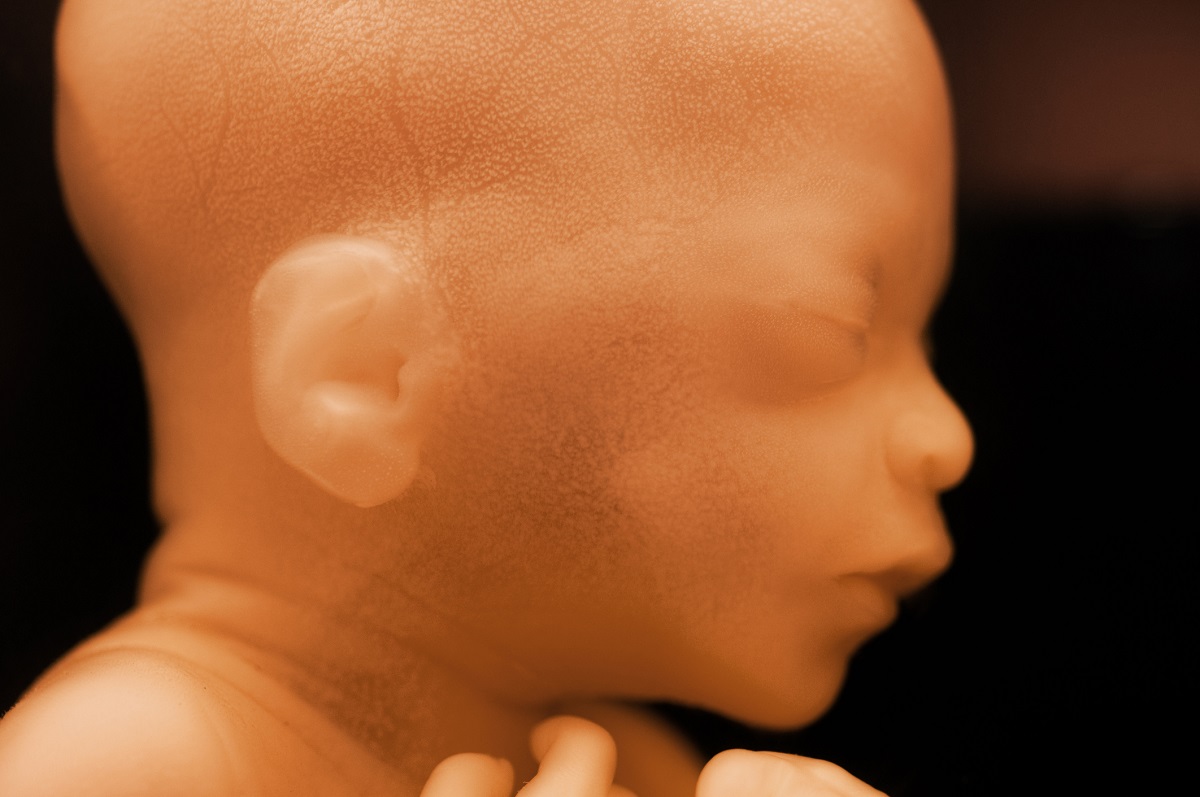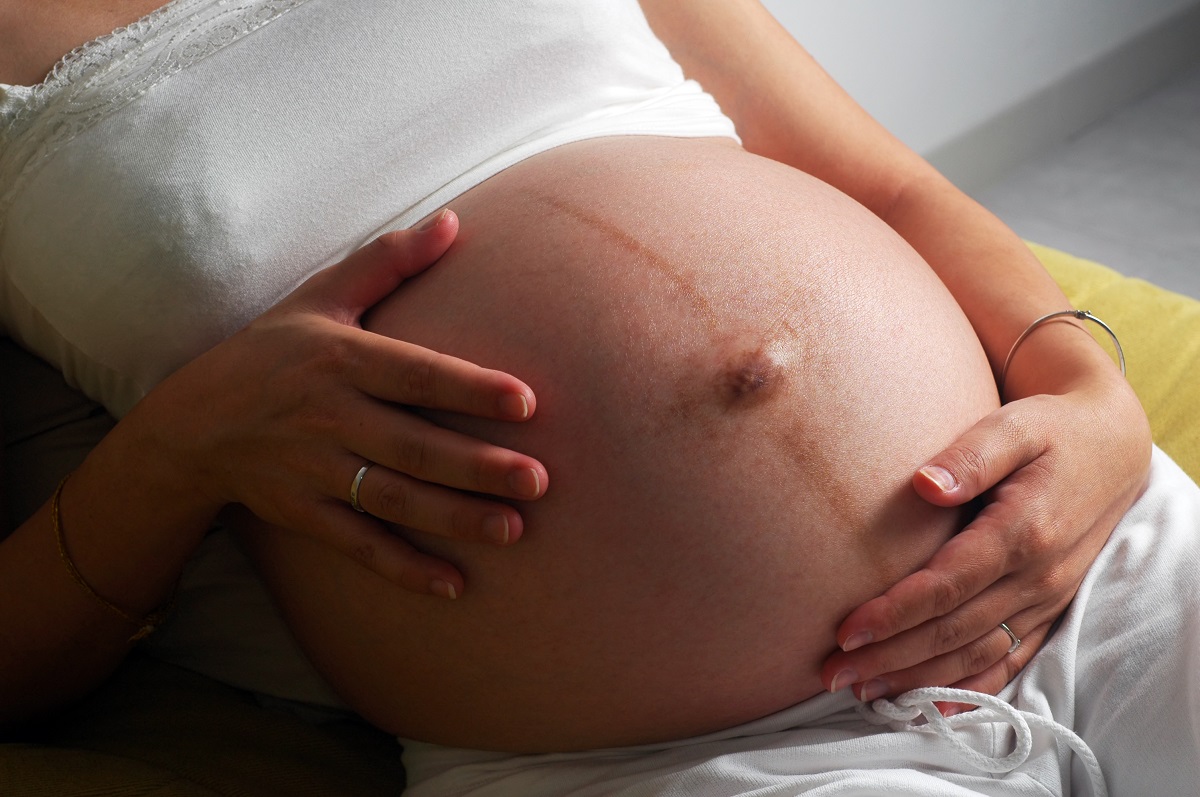- babycenter.com - 23rd week of pregnancy
- whattoexpect.com - 23 weeks of pregnancy
- nhs.uk - Week by week pregnancy guide
- verywellfamily.com - 23 week pregnancy
- healthline.com - Week 23 of pregnancy: symptoms, advice and more
23rd week of pregnancy: is there rapid fetal growth? (23rd TT)

The baby is growing and you are becoming more and more aware of its movements. In a few weeks, your whole tummy will be moving as your baby does acrobatic stunts and somersaults in the womb.
Article content
Week 23: You are 6 months pregnant and in your 2nd trimester.
The baby measures approximately 28 cm and weighs 500 g.
From this point on, it grows a lot. It will double its weight within a month.
During this period, the baby is very active, gaining strength and you will become more and more aware of its movements.
The baby often changes position and stretches when you are lying in bed and trying to fall asleep. That's when it makes itself known. The rocking in the tummy while walking is more pleasant for the baby.
How is the baby developing in your tummy?
His skin is a pinkish-red colour.
The skin is wrinkled because it grows faster than fat. Fat is deposited more slowly. The fat stores are still weak, so you can see the delicate blood vessels and bones through his skin.
By the time you give birth, your baby will have accumulated enough fat reserves to smooth out his skin. He will have a plump appearance.

Fine hairs (lanugo) cover most parts of the fetus's body, along with sebum (vernix). Sebum forms on the fetus's skin from the 20th week of pregnancy. It protects the fetus's skin from leaking and cracking.
The fetal lungs are not yet able to function independently. They are still developing. They do not contain surfactant, which prevents the lung chambers from sticking together after the first breath. Surfactant does not form in the fetal lungs until later.
Despite the further development of the lungs, the fetus in the womb practices breathing movements. The lungs gain some ability to breathe air.
The brain develops very rapidly. So does the nervous system. The nervous system includes the spinal cord, which shortens during this period. Until now, the spinal cord has been the full length of the fetal spine.
The fetus perceives the sounds of its environment. Its hearing develops with each passing day. It perceives all the sounds that surround it. After birth, it can recognize them.
The baby grasps the umbilical cord, lets go and tries to grasp it again. He holds hands, strokes his face.
Fetal vision is increasing. It can sense light coming through the skin and the womb. If you shine a flashlight on the abdomen, your baby can respond and move.
His fingernails extend to the tips of his fingers.
Boys already have a developed scrotum.
The placenta is moistened to nourish the fetus with nutrients and oxygen and to carry waste materials away from the fetal body.
You may feel a gentle, very faint, regular abdominal fluttering. Your baby has probably swallowed amniotic fluid and is hiccupping.
The table shows the approximate measurements of the fetus at 23 weeks, taken with a sonogram
| Total length | Weight | HC Head circumference | BPD Head diameter | AC Abdominal circumference | FL Femur length |
| 28.9 cm | 500 g | 207.8 mm | 58.2 mm | 180,4 mm | 39,4 mm |
For more information on fetal size, see the article:
What is fetal biometry? Ultrasound in pregnancy: fetal size?
A baby born at 23 weeks is not yet ready for life outside the womb, but has a chance of survival.
How a woman feels at 23 weeks of pregnancy.
Your uterus is contracting. The pressure of the uterus on your bladder can make you feel more tired.
The pressure of the growing uterus can cause pain in your side.
You may experience back pain after a harder day. The increasing weight of the uterus and fetus causes your spine to be pulled in more.

Pain appears in the rib area. Your sternum expands to accommodate the growing uterus.
You may also experience headaches during this week.
Tingling in your hands is caused by slight swelling of the hands. The nerves are constricted due to the swelling and tingling to pain in the hands begins. If you feel tingling, relax your hands, shake them and do some exercises to stretch your hands.
You may notice a nosebleed. Your mucous membranes are swollen and more sensitive than before pregnancy.
It is common to have bleeding gums after dental hygiene or after eating harder foods that can cause gum damage. During pregnancy, the gums are more swollen and may be slightly swollen. This can cause bleeding after a little damage.
More than half of women have trouble sleeping. No wonder. It's a big change not only for your psyche, but also a strain on your body.
You may wake up during sleep and have unpleasant strange dreams. These unpleasant dreams disappear after childbirth.
Snoring during sleep is an unpleasant pregnancy symptom. It can disturb your sleep and that of your partner. Snoring occurs due to excess weight, nasal blockage and swelling of the nasal mucosa, which is common in pregnancy.
Bloating and increased flatulence. Your digestion is slowed down due to hormones and therefore your digestive tract will relax and slow down.
Slowed digestion also causes an uncomfortable feeling of heartburn and also constipation.
Constipation in pregnancy and increased stool pressure can trigger the development of painful hemorrhoids.
Cramps in the legs can wake you up during sleep.
Pain in the hips during sleep or while walking is caused by the expanding bones of the pelvis. The pelvis is relaxing and preparing for the birth of the fetus.
In this period of pregnancy, you may also experience blurred vision, a feeling of dry eyes. These symptoms are caused by pregnancy hormones and fluid retention in the body.
As a result of pregnancy hormones, you may experience mood changes, hot flashes or dizziness.
Swollen hands and swelling of the lower legs, especially in the ankle area, are also common symptoms of pregnancy.
During pregnancy, there is an increased risk of vaginal infections. If you notice changes in your vaginal discharge, its colour, consistency or smell, inform your gynaecologist.
There is an increased risk of urinary tract infection during pregnancy. Pressure is put on your bladder and it is partially squeezed by the growing uterus.
Hardening of the abdomen
Have you felt uncomfortable pressure in your abdomen?
A feeling of tightening, hardening of the abdomen. Your uterus, which was previously soft, has hardened like a stone?
These are errands, which are also called Braxton Hicks contractions. A short-term hardening of the abdomen that occurs several times during the day is quite normal. It is the preparation of the uterus for childbirth.
Abdominal hardening is more likely to occur after exertion. If you feel abdominal hardening, lie down or sit up and try to relax.
Are you afraid of premature labour?
If you feel a momentary hardening of the abdomen, you don't need to worry. It is a perfectly normal phenomenon during pregnancy if it occurs several times during the day.
When is premature labour imminent?
Premature birth is more common:
- in pregnancies with multiple fetuses
- with changes or diseases of the uterus
- when infections occur
- if you have already given birth prematurely once
- after uterine and cervical surgery
Symptoms of preterm labor that require immediate medical attention
- Incipient back pain with uterine contractions at regular intervals
- Changes in vaginal discharge, amniotic fluid drainage or bleeding
- Occurrence of abdominal cramping and feeling of pressure on the pelvis
If you have one or more of these symptoms, visit the nearest hospital immediately. If preterm labour is imminent, the hospital will give you the treatment you need to stop the uterine contractions. The aim of the treatment is to keep the foetus in the womb for as long as possible, increasing its chances of survival.
What can you observe?
Your baby's movements make your day. Enjoy them. In a few weeks, the gentle kicking and rolling will be stronger, sometimes even painful.
Droplets of colostrum, your first breast milk, may leak from your nipples as your breasts swell and swell.
Increased appetite is very common. You'll wonder what you could eat and how much. No wonder. You're not only nourishing yourself, but your baby too.
But watch out for a lot of weight gain. Try to eat mostly healthy and easily digestible foods. Extra pounds are harder to shed after childbirth, and you'll feel them with reduced energy when you give birth.
With weight gain and the growth of the pregnant belly, some mothers start to develop stretch marks at this time. These are caused by the sudden stretching of the skin, which then tears and leaves visible lines on the skin.
It is common in pregnancy for the skin to change colour due to pregnancy hormones. It is particularly visible on the breast areolae, which are darker. A dark line appears on the abdomen, starting from the pubic bone and progressing up through the navel. It is also known as linea nigra.
In women with darker skin, this colour difference is more intense.

Pigment discoloration of the skin on the face, especially in the forehead, nose and around the eyes, is also known as pregnancy mask (chloasma). These pigment changes often disappear a few weeks after childbirth.
More likely to forget?
In pregnancy, many women feel that they cannot concentrate, have a foggy feeling when thinking and forget more often. This is normal. It is also referred to as pregnancy brain.
Pregnancy counseling at 23 weeks of pregnancy
There are no special tests waiting for you in this week.
The doctor will check your blood pressure, urine for protein, swelling, record your weight. He will ask about any symptoms and about hardening of the abdomen. He will check the condition of your uterus and cervix.
If the cervix is open, there is a risk of premature birth. In this case, cerclage is performed, where a special stitch is used to close the cervix.
What to watch out for?
- Your diet should be varied, easily digestible, with plenty of fresh vegetables, fruit, nuts, wholemeal bread.
- Salmon is recommended for fetal brain development, no more than twice a week.
- Supplement your diet with foods rich in calcium. Your baby takes calcium from your diet and stores it in his bones.
- Avoid fatty and heavy foods that upset your stomach and cause digestive problems and heartburn.
- If you are worried about swelling, limit salting.
- Don't forget to drink! Try to stay hydrated and drink at least 2-3 litres of water during the day.
- During pregnancy, it is recommended to take prenatal vitamins available at pharmacies to supplement the vitamins needed during pregnancy for healthy fetal development.
- Move around, go for walks, get some fresh air.
- An excellent exercise in the comfort of your home is pregnancy yoga, which will make you stronger, stress-free and relaxed.
- Pelvic floor strengthening exercises Kegel exercises to avoid uncomfortable urine leakage.
- Wear comfortable shoes that don't squeeze.
- Reach for comfortable clothes that do not press and do not hinder your movement.
- When your feet swell, lift them up, rest and avoid sitting and standing for long periods.
- If you can, rest during the day.
- Increase skin care. Regular moisturising with fragrance-free moisturisers and gentle skin massage will reduce the appearance of stretch marks.
- Avoid direct sun exposure. Your skin is more sensitive and you can get sunburned.
- Be careful when choosing herbal teas. Some herbs could harm you.
- Be especially careful when using chemical products such as detergents, dyeing your hair with ammonia-containing dyes. All chemicals can pass through your skin into your bloodstream, and so pass through the placenta into the fetus.
- If you have pets at home, clean their toilet with gloves. You will prevent contact with faeces, which may contain dangerous bacteria.
Read also other interesting articles about pregnancy:
- What is pre-eclampsia? Does it pose a risk to pregnancy?
- How to recognize pre-eclampsia and its symptoms in pregnancy? What are the risks of pre-eclampsia?
- Protein in the urine during pregnancy? May or may not be a problem
- Discharge in pregnancy. What is considered normal discharge? And how does infection manifest itself?
- Hemorrhoids in pregnancy and after childbirth
- Head spinning in pregnancy: at the beginning and as a symptom, what else does it mean?
- How much to gain weight during pregnancy? What does it depend on and what to watch out for?
- What to do with constipation and how to defecate without difficulty?
Learn more about the other weeks of pregnancy in the summary article.
Gallery



Interesting resources
Related










